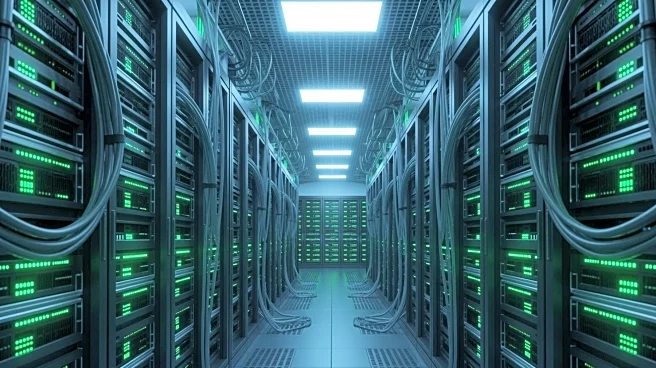What's Happening?
Data centers are critical to the functioning of AI systems, hosting servers that power computations for models like ChatGPT and Gemini. The U.S. has seen a significant increase in data centers, now hosting over
5,388 facilities. These centers consume substantial amounts of electricity, with projections indicating they could account for up to 12% of the nation's electricity usage by 2028. Despite their importance, data centers face opposition due to their energy demands and environmental impact. Local communities have resisted new projects, citing concerns over utility bills, noise pollution, and limited job creation. However, data centers also bring investment and revitalization to communities.
Why It's Important?
Data centers are vital for maintaining U.S. competitiveness in AI, a technology with far-reaching implications for industries and national security. The expansion of data centers supports technological advancements but poses challenges for energy infrastructure and environmental sustainability. The opposition to data centers highlights the need for balanced development that addresses community concerns while supporting technological progress. The investments associated with data centers can stimulate local economies, providing jobs and infrastructure improvements. Ensuring fair utility rates and sustainable energy practices is crucial for the long-term viability of data centers and the U.S.'s position in the global AI landscape.
What's Next?
Communities and regulators are exploring solutions to address the challenges posed by data centers. Some states are creating separate utility rate classes to ensure large-load customers pay their fair share. Transparency in tax arrangements and utility contracts is essential to prevent cost burdens on residential ratepayers. Companies are encouraged to invest in efficiency and renewable energy to mitigate environmental impacts. The ongoing debate over data center development will shape the future of AI infrastructure in the U.S., influencing the country's ability to lead in the next technological era.
Beyond the Headlines
The development of data centers raises broader questions about the U.S.'s approach to technological infrastructure and environmental sustainability. The reliance on data centers underscores the importance of energy efficiency and renewable energy sources. The opposition to data centers reflects broader societal concerns about the impact of technology on communities and the environment. Addressing these concerns requires collaboration between government, industry, and communities to ensure responsible development. The stakes are high, as the U.S.'s ability to maintain technological leadership depends on its capacity to balance innovation with sustainability.










